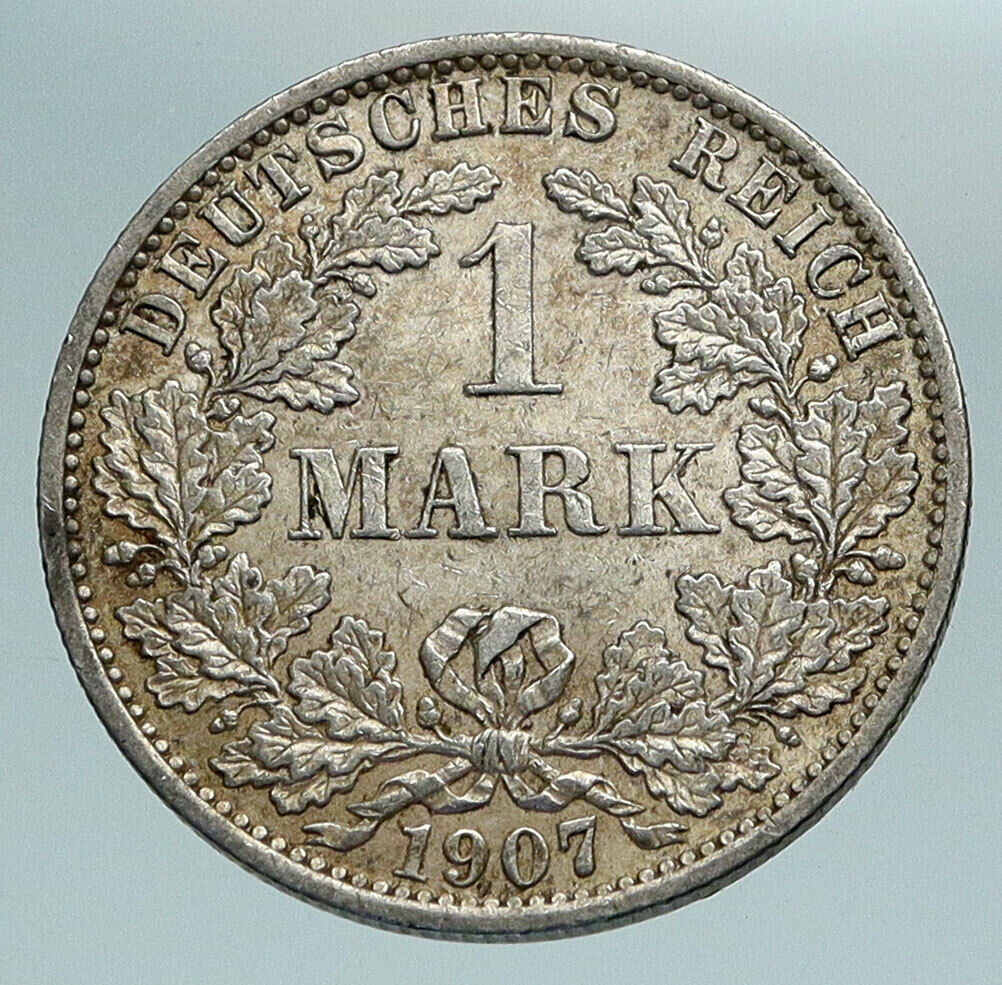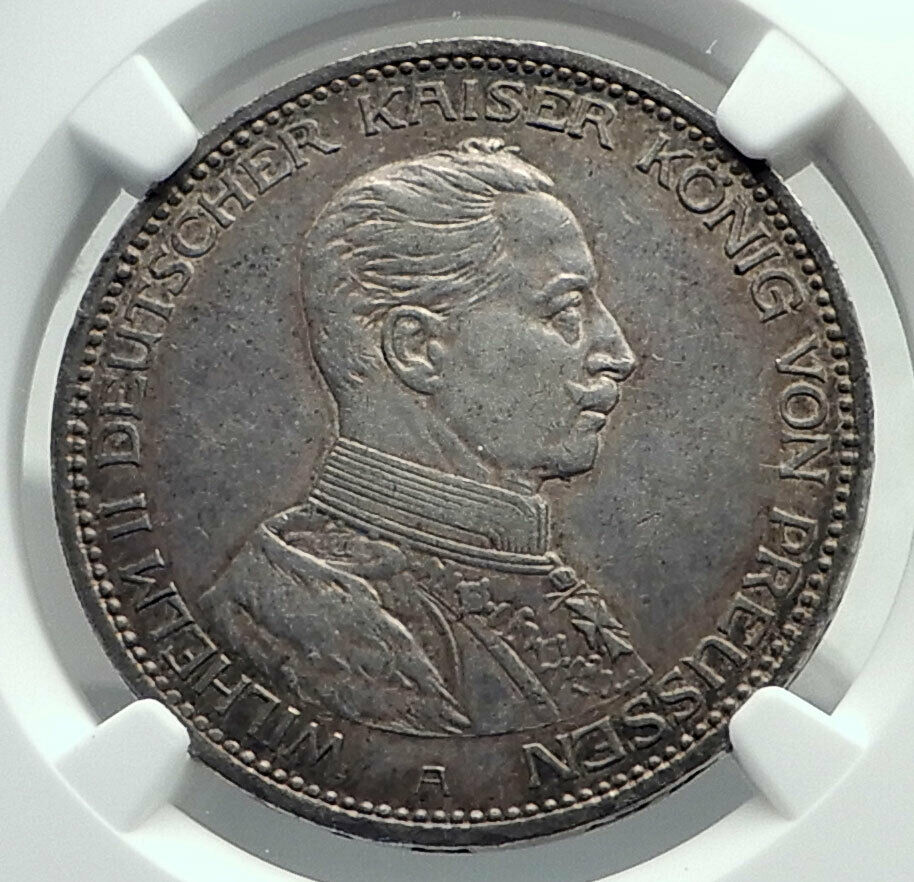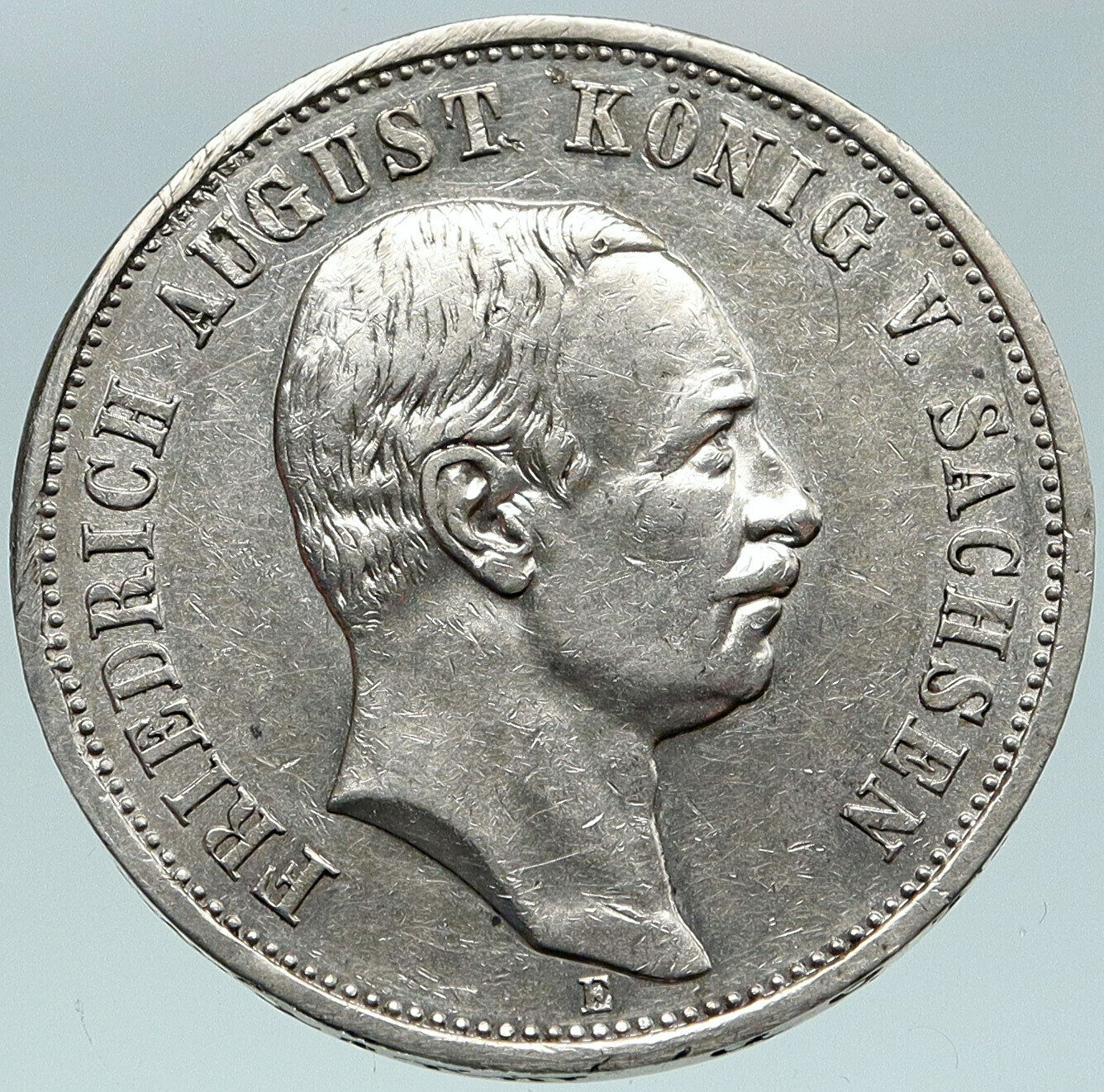|
Germany Empire
Wilhelm II – Emperor: 15 June 1888 – 9 November 1918
1914
A Silver 1 Mark 24mm (5.50 grams) 0.900 silver (0.1596 ASW)
Reference: KM# 14
DEUTSCHES REICH around 1 MARK within wreath, year below.
Crowned imperial eagle with shield on breast, mint letter below.
You are bidding on the exact item pictured, provided with a Certificate of Authenticity and Lifetime Guarantee of Authenticity.
Coin Mint Letters of Germany
| A – Berlin | D – Munich | E – Muldenhutten (1887-1953) | F – Stuttgart | G – Karlsruhe | J – Hamburg |
 Wilhelm II or William II (German: Friedrich Wilhelm Viktor Albrecht von Preußen; Frederick William Victor Albert of Prussia; 27 January 1859 – 4 June 1941) was the last German Emperor (Kaiser) and King of Prussia, ruling the German Empire and the Kingdom of Prussia from 15 June 1888 to 9 November 1918. He was the eldest grandson of the British Queen Victoria and related to many monarchs and princes of Europe. Wilhelm II or William II (German: Friedrich Wilhelm Viktor Albrecht von Preußen; Frederick William Victor Albert of Prussia; 27 January 1859 – 4 June 1941) was the last German Emperor (Kaiser) and King of Prussia, ruling the German Empire and the Kingdom of Prussia from 15 June 1888 to 9 November 1918. He was the eldest grandson of the British Queen Victoria and related to many monarchs and princes of Europe.
Crowned in 1888, he dismissed the Chancellor, Otto von Bismarck, in 1890 and launched Germany on a bellicose “New Course” in foreign affairs that culminated in his support for Austria-Hungary in the crisis of July 1914 that led in a matter of days to the First World War. Bombastic and impetuous, he sometimes made tactless pronouncements on sensitive topics without consulting his ministers, culminating in a disastrous Daily Telegraph interview that cost him most of his power in 1908. His top generals, Paul von Hindenburg and Erich Ludendorff, dictated policy during the First World War with little regard for the civilian government. An ineffective war leader, he lost the support of the army, abdicated in November 1918, and fled to exile in the Netherlands.
 Germany, officially the Federal Republic of Germany, officially the Federal Republic of  Germany is a federal parliamentary republic in western-central Europe. It includes 16 constituent states and covers an area of 357,021 square kilometres (137,847 sq mi) with a largely temperate seasonal climate. Its capital and largest city is Berlin. With 81 million inhabitants, Germany is the most populous member state in the European Union. After the United States, it is the second most popular migration destination in the world. Germany is a federal parliamentary republic in western-central Europe. It includes 16 constituent states and covers an area of 357,021 square kilometres (137,847 sq mi) with a largely temperate seasonal climate. Its capital and largest city is Berlin. With 81 million inhabitants, Germany is the most populous member state in the European Union. After the United States, it is the second most popular migration destination in the world.
Various Germanic tribes have occupied northern Germany since classical antiquity. A region named Germania was documented before 100 CE. During the Migration Period the Germanic tribes expanded southward. Beginning in the 10th century, German territories formed a central part of the Holy Roman Empire. During the 16th century, northern German regions became the centre of the Protestant Reformation.
The rise of Pan-Germanism inside the German Confederation resulted in the unification of most of the German states in 1871 into the Prussian-dominated German Empire. After World War I and the German Revolution of 1918-1919, the Empire was replaced by the parliamentary Weimar Republic. The establishment of the Third Reich in 1933 led to World War II and the Holocaust. After 1945, Germany split into two states, East Germany and West Germany. In 1990, the country was reunified.
 In the 21st century, Germany is a great power and has the world’s fourth-largest economy by nominal GDP, as well as the fifth-largest by PPP. As a global leader in several industrial and technological sectors, it is both the world’s third-largest exporter and importer of goods. Germany is a developed country with a very high standard of living sustained by a skilled and productive society. It upholds a social security and universal health care system, environmental protection and a tuition free university education. In the 21st century, Germany is a great power and has the world’s fourth-largest economy by nominal GDP, as well as the fifth-largest by PPP. As a global leader in several industrial and technological sectors, it is both the world’s third-largest exporter and importer of goods. Germany is a developed country with a very high standard of living sustained by a skilled and productive society. It upholds a social security and universal health care system, environmental protection and a tuition free university education.
Germany was a founding member of the European Union in 1993. It is part of the Schengen Area, and became a co-founder of the Eurozone in 1999. Germany is a member of the United Nations, NATO, the G8, the G20, and the OECD. The national military expenditure is the 9th highest in the world. Known for its rich cultural history, Germany has been continuously the home of influential artists, philosophers, musicians, sportsmen, entrepreneurs, scientists and inventors.
|





 Wilhelm II or William II (German: Friedrich Wilhelm Viktor Albrecht von Preußen; Frederick William Victor Albert of Prussia; 27 January 1859 – 4 June 1941) was the last German Emperor (Kaiser) and King of Prussia, ruling the German Empire and the Kingdom of Prussia from 15 June 1888 to 9 November 1918. He was the eldest grandson of the British Queen Victoria and related to many monarchs and princes of Europe.
Wilhelm II or William II (German: Friedrich Wilhelm Viktor Albrecht von Preußen; Frederick William Victor Albert of Prussia; 27 January 1859 – 4 June 1941) was the last German Emperor (Kaiser) and King of Prussia, ruling the German Empire and the Kingdom of Prussia from 15 June 1888 to 9 November 1918. He was the eldest grandson of the British Queen Victoria and related to many monarchs and princes of Europe. Germany, officially the Federal Republic of
Germany, officially the Federal Republic of  Germany is a federal parliamentary republic in western-central Europe. It includes 16 constituent states and covers an area of 357,021 square kilometres (137,847 sq mi) with a largely temperate seasonal climate. Its capital and largest city is Berlin. With 81 million inhabitants, Germany is the most populous member state in the European Union. After the United States, it is the second most popular migration destination in the world.
Germany is a federal parliamentary republic in western-central Europe. It includes 16 constituent states and covers an area of 357,021 square kilometres (137,847 sq mi) with a largely temperate seasonal climate. Its capital and largest city is Berlin. With 81 million inhabitants, Germany is the most populous member state in the European Union. After the United States, it is the second most popular migration destination in the world. In the 21st century, Germany is a great power and has the world’s fourth-largest economy by nominal GDP, as well as the fifth-largest by PPP. As a global leader in several industrial and technological sectors, it is both the world’s third-largest exporter and importer of goods. Germany is a developed country with a very high standard of living sustained by a skilled and productive society. It upholds a social security and universal health care system, environmental protection and a tuition free university education.
In the 21st century, Germany is a great power and has the world’s fourth-largest economy by nominal GDP, as well as the fifth-largest by PPP. As a global leader in several industrial and technological sectors, it is both the world’s third-largest exporter and importer of goods. Germany is a developed country with a very high standard of living sustained by a skilled and productive society. It upholds a social security and universal health care system, environmental protection and a tuition free university education.




